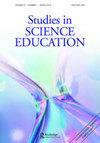Learners’ challenges in understanding and performing experiments: a systematic review of the literature
IF 9.9
2区 教育学
Q1 EDUCATION & EDUCATIONAL RESEARCH
引用次数: 4
Abstract
ABSTRACT In today’s world shaped by technology and the natural sciences, knowledge and skills related to experimentation are crucial, especially given growing public debates about science-related topics. Despite a strong emphasis on experimentation in science curricula worldwide, learners still encounter diverse challenges when experimenting. This paper provides a systematic review of empirical research on learners’ challenges during the following inquiry phases: stating research questions, generating hypotheses, planning and conducting an experiment, analysing data and drawing conclusions. A database search and an analysis of two prior narrative literature reviews identified 368 studies, of which 66 were used for further analyses after screening for eligibility using specific inclusion criteria. The analyses revealed 43 challenges at the conceptual, procedural and epistemic level that not only elementary but even university students face during experimentation. Additionally, cognitive biases and preconceptions are identified as a source of such challenges. Overall, the findings demonstrate a lack of in-depth research on stating research questions despite its importance for experimentation, whilst learners’ abilities in the other inquiry phases have been intensively investigated. The results offer valuable information for science education research and provide a basis for tailored scaffolding in the science classroom or the design of effective instructional interventions.学习者在理解和执行实验方面的挑战:文献的系统综述
在当今由技术和自然科学塑造的世界中,与实验相关的知识和技能至关重要,特别是考虑到公众对科学相关话题的争论越来越多。尽管世界各地的科学课程都非常强调实验,但学习者在实验时仍然会遇到各种各样的挑战。本文对学习者在以下探究阶段面临的挑战进行了系统的实证研究:提出研究问题、提出假设、计划和进行实验、分析数据和得出结论。数据库检索和对先前两篇叙述性文献综述的分析确定了368项研究,其中66项研究在使用特定纳入标准筛选合格性后用于进一步分析。这些分析揭示了在概念、程序和认知层面上的43个挑战,这些挑战不仅是小学生,甚至是大学生在实验过程中面临的。此外,认知偏见和先入之见被认为是这些挑战的来源。总体而言,研究结果表明缺乏对陈述研究问题的深入研究,尽管它对实验很重要,而学习者在其他探究阶段的能力已经得到了深入的研究。研究结果为科学教育研究提供了有价值的信息,并为科学课堂的量身定制脚手架或设计有效的教学干预提供了依据。
本文章由计算机程序翻译,如有差异,请以英文原文为准。
求助全文
约1分钟内获得全文
求助全文
来源期刊

Studies in Science Education
EDUCATION, SCIENTIFIC DISCIPLINES-
CiteScore
15.30
自引率
2.00%
发文量
7
审稿时长
>12 weeks
期刊介绍:
The central aim of Studies in Science Education is to publish review articles of the highest quality which provide analytical syntheses of research into key topics and issues in science education. In addressing this aim, the Editor and Editorial Advisory Board, are guided by a commitment to:
maintaining and developing the highest standards of scholarship associated with the journal;
publishing articles from as wide a range of authors as possible, in relation both to professional background and country of origin;
publishing articles which serve both to consolidate and reflect upon existing fields of study and to promote new areas for research activity.
Studies in Science Education will be of interest to all those involved in science education including: science education researchers, doctoral and masters students; science teachers at elementary, high school and university levels; science education policy makers; science education curriculum developers and text book writers.
Articles featured in Studies in Science Education have been made available either following invitation from the Editor or through potential contributors offering pieces. Given the substantial nature of the review articles, the Editor is willing to give informal feedback on the suitability of proposals though all contributions, whether invited or not, are subject to full peer review. A limited number of books of special interest and concern to those involved in science education are normally reviewed in each volume.
 求助内容:
求助内容: 应助结果提醒方式:
应助结果提醒方式:


